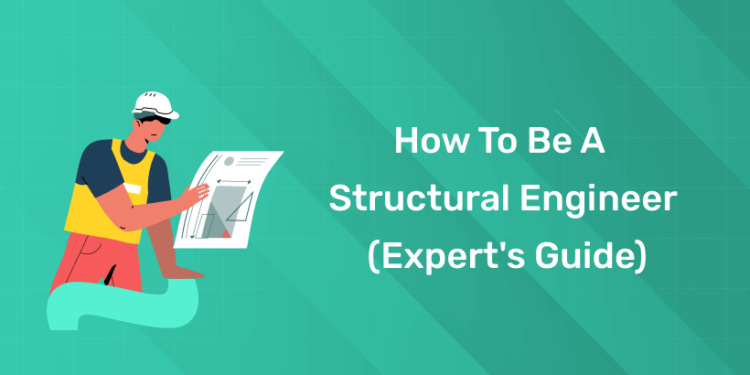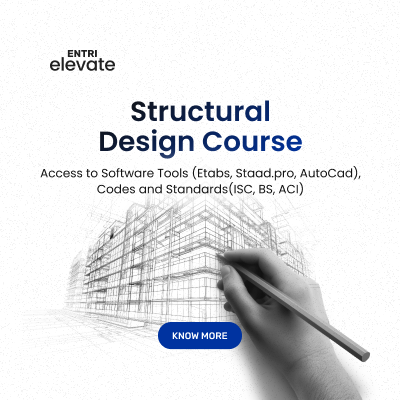Table of Contents
Structural engineering is a branch of civil engineering which deals with the design, construction and maintenance of structures that can withstand various forces and loads. From skyscrapers to bridges, structural engineers keep our built environment safe and sound. If you want to be a structural engineer, this guide will walk you through. We will cover the steps, education, certification and career progression. And we will also introduce Entri’s Structural Design Course to help you along the way.
Steps to be a Structural Engineer
1. Get a Bachelor’s Degree in Civil Engineering
The first step to be a structural engineer is to get a bachelor’s degree in civil engineering or related field. A civil engineering program will give you a solid foundation in mathematics, physics and engineering principles. Key subjects you will study are:
- Structural Analysis
- Material Science
- Fluid Mechanics
- Geotechnical Engineering
- Construction Management
2. Get Practical Experience
While pursuing your degree, look for internships or co-op opportunities to get hands on experience. Working under the supervision of experienced engineers will help you apply theoretical knowledge to real world projects. Internships also provide networking opportunities and can lead to full time job offers upon graduation.
3. Advanced Education (Optional)
Although not mandatory, getting a master’s degree in structural engineering or related field can add to your knowledge and career prospects. Advanced education allows you to specialise in areas like earthquake engineering, structural dynamics or advanced materials.
4. Get Professional Certification
Getting a Professional Engineer (PE) license is a key step in your career progression. The process involves:
- Pass the Fundamentals of Engineering (FE) exam
- Get relevant work experience (usually 4 years)
- Pass the PE exam in your discipline
Certification proves your competence and dedication to the profession and opens up more job opportunities and higher salary.
Build A Career In Structural Engineering! Get Free Demo Classes!!
5. Enroll in Entri’s Structural Design Course
To add to your skills and knowledge, enroll in Entri’s Structural Design Course. This course covers all the essential topics for structural engineers:
- Fundamentals of structural design
- Analysis and design of different structures
- Material properties and selection
- Use of advanced design software
- Real world case studies and projects
Why Entri’s Structural Design Course?
- Expert Trainers: Learn from experienced structural engineers and industry experts.
- Practical: Get hands on experience through real world projects and simulations.
- Self Paced: Access course materials online and study at your own time.
- Certification: Get a recognized certificate upon completion and boost your credentials and employability.
For more information about Entri’s Structural Design Course, visit Entri’s Structural Design Course.
6. Develop Skills
Structural engineers need to have multiple skills to excel in their job. Focus on developing:
- Technical Skills: Proficiency in CAD and simulation software, knowledge of building codes and regulations.
- Analytical Skills: Ability to analyze complex data, strong problem solving skills.
- Communication Skills: Communication with architects, contractors and other stakeholders.
- Project Management Skills: Ability to manage projects, budgeting, scheduling and resource allocation.
- Attention to Detail: Ensure designs are accurate and compliant with regulations.
7. Get Work Experience
Start with junior positions in construction companies or consultancy firms. Working on various projects helps you gain experience in different areas and build a portfolio.
8. Continue Education and Professional Development
Stay updated with latest developments by attending workshops, seminars and conferences. Join professional bodies like Institution of Engineers (India) for networking and opportunities.
Career Progression
1: What is the primary purpose of structural design?
What is the primary purpose of structural design?
- A. To ensure the aesthetic appearance of a structure
- B. To ensure a structure can withstand applied loads
- C. To calculate construction costs
- D. To select building materials based on color
Ever wondered how much you really know? It’s time to put your brain to the test!
Entry Level
Begin as a junior or entry level structural engineer, assist with design calculations, prepare drawings and conduct site visits.
Mid Level
With experience move to mid level positions like project engineer or senior structural engineer and manage projects and lead design teams.
Senior Level
Experienced engineers can move to senior roles like principal engineer or project manager and oversee multiple projects and make critical design decisions.
Specialized Roles
Specialize in areas like seismic design, bridge engineering or forensic engineering to open up new career paths and increase earning potential.
Academic and Research
Pursue a Ph.D. for opportunities in teaching and research and contribute to the education of future engineers and be involved in research.
Build A Career In Structural Engineering! Get Free Demo Classes!!
Transform Your Career with Our Structural Design Course!
Unlock Your Potential in Structural Design! Gain expert knowledge in designing robust structures and advance your career in the construction and engineering fields. Limited spots available! 🌟
Know MoreSummary
To become a structural engineer in India you need a mix of education, practical experience and continuous learning. Follow the steps mentioned above and you can have a successful career in this field. Whether it’s designing skyscrapers or bridges, your work as a structural engineer will have a lasting impact on the society.
Join Structural Design Course by Entri and get the knowledge and practical experience to excel in this field. This course covers all the essential topics and has hands on learning opportunities to build a strong foundation in structural engineering. Don’t wait, explore Entri’s course today and start your journey to become a structural engineer.
|
Engineering Upskilling Courses
|
| MEP Course |
| BIM Course |
| Quantity Surveyor Course |
| Structural Design Course |
| MEP QS Course |
Transform Your Career with Our Structural Design Course!
Unlock Your Potential in Structural Design! Gain expert knowledge in designing robust structures and advance your career in the construction and engineering fields. Limited spots available! 🌟
Know MoreFrequently Asked Questions
What is structural engineering?
Structural engineering is a branch of civil engineering focused on the design, construction, and maintenance of structures such as buildings, bridges, and other infrastructure to ensure their stability and safety.
What does a structural engineer do?
Structural engineers analyze and design structures to withstand loads and forces, ensuring they are safe and durable. They work on projects including buildings, bridges, tunnels, and other infrastructure.
What are the key skills required for a structural engineer?
Essential skills include strong analytical and problem-solving abilities, proficiency in CAD and structural analysis software, knowledge of building codes, and effective communication and project management skills.
What software is commonly used in structural design ?
Commonly used software in structural design courses includes Autodesk Revit, ETABS, and STAAD Pro. These software tools facilitate the analysis, design, and modeling of structural systems.
What are the future trends in structural design?
Future trends in structural design include the integration of digital technologies such as Building Information Modeling (BIM), parametric design, and artificial intelligence for optimized and sustainable structural solutions. Also, there is growing interest in modular and prefabricated construction methods for efficient and cost-effective design and construction processes.
How can I prepare for a structural engineering interview?
To prepare for an interview, review fundamental concepts, stay updated with the latest industry trends, practice problem-solving, and be ready to discuss past projects and your role in them. Completing relevant courses, like Entri’s Structural Design Course, can also enhance your knowledge and confidence.














